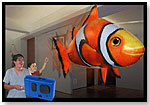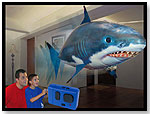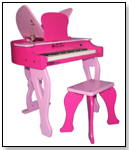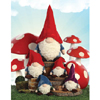|
|
Q&A With Blake English, Inventor of Air Swimmers 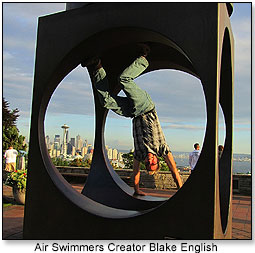 When TDmonthly Magazine saw the Air Swimmers at Toy Fair 2011 in New York, they were already generating a buzz. Now, less than a year later, Air Swimmers inventor Blake English has won the Rising Star Inventor of the Year TAGIE Award for his best selling flying fish. Below, Blake tells TDmonthly about his original inspiration, how he broke into the Toy Industry, and why innovation is the essential ingredient to his success. When TDmonthly Magazine saw the Air Swimmers at Toy Fair 2011 in New York, they were already generating a buzz. Now, less than a year later, Air Swimmers inventor Blake English has won the Rising Star Inventor of the Year TAGIE Award for his best selling flying fish. Below, Blake tells TDmonthly about his original inspiration, how he broke into the Toy Industry, and why innovation is the essential ingredient to his success.Q. How did you come up with the idea for your first product? A. For the Air Swimmers, I was visiting an aquarium and thought that the swimming sharks looked like they were flying through the water. I really liked the effect and wondered if it could be done out of the water. The Air Swimmers are the result of that speculation. Q. How long did it take to go from the original spark of an idea to actual production? A. The Air Swimmers took over three years between inspiration and the start of production. During the first year or so it was just an idea in the back of my head. Once I started working on prototypes it took about two years to get everything figured out. The last 5% of development took up 95% of the time. Q. What were the top two or three most significant obstacles you had to overcome to get your product on the market and how did you do it? A. Communication. What? I'd say that misunderstandings during the pre-production phase caused us the most headaches. Q. How much money did you need to create the first prototype and come up with a business plan? A. Air Swimmers cost more to develop than any other product I've worked on. Many 10's of thousands of dollars were spent on development and prototyping. Q. How did you raise it, and how long did it take to raise it? A. We are a forward-looking development company and have a large R&D budget (percentage wise). Q. What is your educational background? A. My undergraduate degree is in Product Design ('09) from Stanford University, and my graduate degree in Mechanical Engineering: Robotics ('10) is also from Stanford. Q. How did you first get involved in the Toy Industry? A. I met Mark Forti, president and owner of the William Mark Corp, at a family holiday party. We got to talking about a product he was working on, and I was able to solve a few engineering problems; he hired me right then and there. That product became the very successful Flitter Fairies. Q. What aspect of the toy industry most surprised you when you first started? A. I had expected a lot more creativity, originality, and fun in the toy industry. However, it appears that low margins, competition, and regulation have crushed the creative (and playful) spirits of a lot of the people involved. 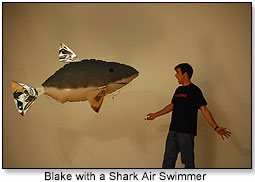 Q. How do you strive to maintain "creativity, originality, and fun" in the toy industry when you are up against such "low margins, competition, and regulation"? Q. How do you strive to maintain "creativity, originality, and fun" in the toy industry when you are up against such "low margins, competition, and regulation"? A. Coming up with ideas is not a problem we face. We have way more ideas than we can possibly turn into products. We have scrapped great products because we have invented better ones. A large part of my background is in "Design for Manufacturability" and I am constantly thinking about how a potential product will be produced. Doing this in the first step of the process helps to eliminate headaches down the road, but does sometimes hamper creativity. Many excellent products had to be scrapped because they were not easily and readily manufacturable. That isn't to say that we don't push the limits of manufacturing; we do that all the time. Flying products must be extremely light, which poses a challenge additional to the ones I already mentioned. We never work on a product that is similar to anything in the marketplace. Q. Do you feel that your young age has been a detriment or a catalyst to your success? A. Not knowing the extent of what I was getting myself into was certainly helpful, but I don't think my age had anything to do with it. [My] ignorance was detrimental, yes; age, no. Q. We briefly interviewed you last year during Toy Fair (see video below), and Air Swimmers was already generating quite a buzz. Did you expect to get such a huge response? A. I loved the product from the moment I thought of it. I still do. However, the big question that needed to be answered was, "Will other people like it as much as I do?" When you have worked on something for years, you get too close to it to have an objective opinion about it. I had no idea it would generate as much buzz as it did, but have to say I wasn't surprised. The unknown had been answered when I saw people looking up in wonder, and smiling. Q. How do you hope your product/s will affect children's lives? A. Not every toy needs to inspire children to be more creative, or smart, or more healthy. However, I do hope that one of my toys will instill self-reliance and confidence in some of those that play with it. I'm not sure which toy this will be, but it is one of the things I'm working towards. Q. What one unique quality makes your product better than your competition? A. The best feature of our products is the product that comes after it. Each one is unique and inspiring. I try to design products that are unusual in some way. I won't do a close variation to something that is already in the marketplace. 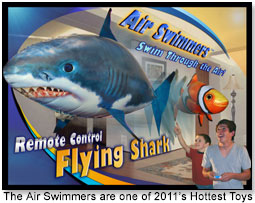 Q. What were the top two or three best pieces of advice you received, and from whom? Q. What were the top two or three best pieces of advice you received, and from whom?A. "The best way to have a good idea is to have lots of ideas" - Dr. Linus Pauling (He didn't tell me this in person, but it is a quote that is very relevant and summarizes the best advice I've been given). Q. What advice would you give to aspiring toy and game designers and inventors? A. Find the story behind your product. Find lots of stories and pick the best one. The product is only an accessory to the story you are trying to tell. Once you have a good story, selling the product will be no problem. Q. What is your favorite toy or game? A. I love my 3D printer. My favorite activity is creating things, and this tool seems to me too be much more like a toy.
 Writer's Bio: Justina Huddleston graduated Magna Cum Laude from Emerson College with a BA in Writing, Literature, and Publishing in 2009. After graduating she was the on-site director of the Boston Children's Museum gift store for a year, selling educational, developmental, and creative activity toys that tied in with the museum's exhibits. Justina also interned at children's book publisher Candlewick Press before moving from Boston to Los Angeles, where she is now Editorial Director of TDmonthly Magazine. Read more articles by this author Writer's Bio: Justina Huddleston graduated Magna Cum Laude from Emerson College with a BA in Writing, Literature, and Publishing in 2009. After graduating she was the on-site director of the Boston Children's Museum gift store for a year, selling educational, developmental, and creative activity toys that tied in with the museum's exhibits. Justina also interned at children's book publisher Candlewick Press before moving from Boston to Los Angeles, where she is now Editorial Director of TDmonthly Magazine. Read more articles by this author |
| ||||||||||||||||||||||||||||||||||||||||||
Disclaimer Privacy Policy Career Opportunities
Use of this site constitutes acceptance of our Terms of Use.
© Copyright 2025 PlayZak®, a division of ToyDirectory.com®, Inc.

